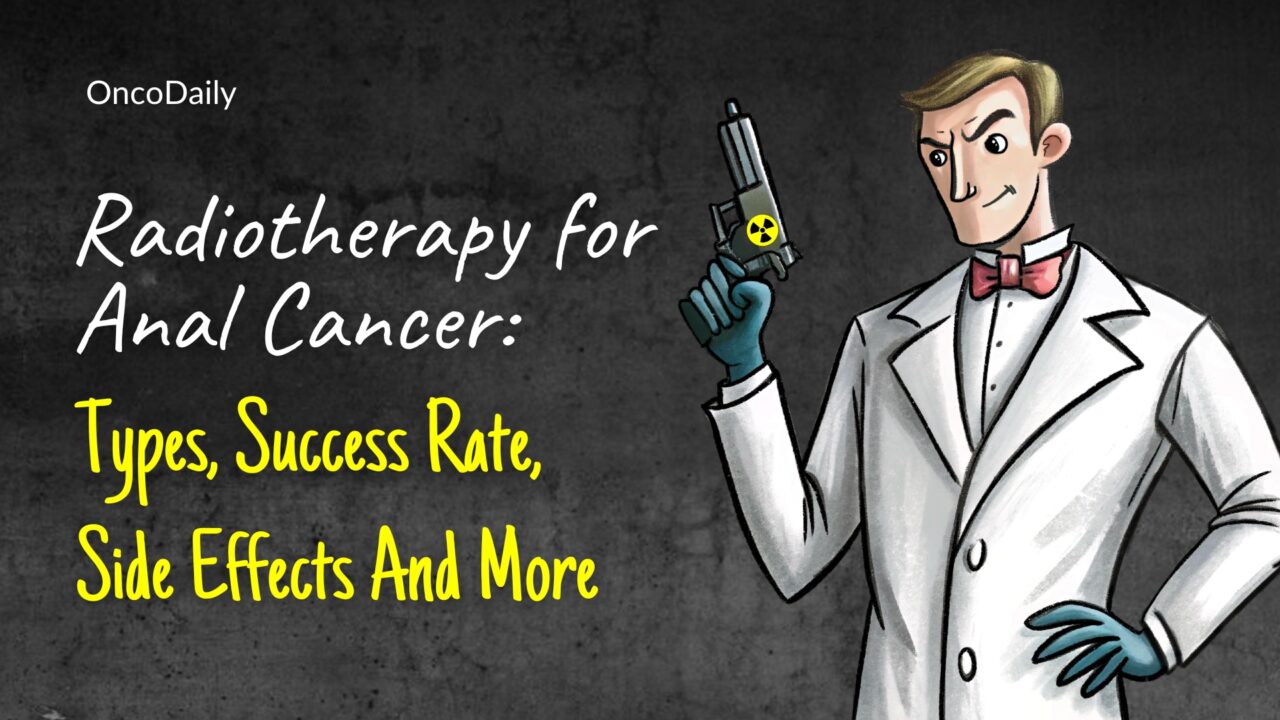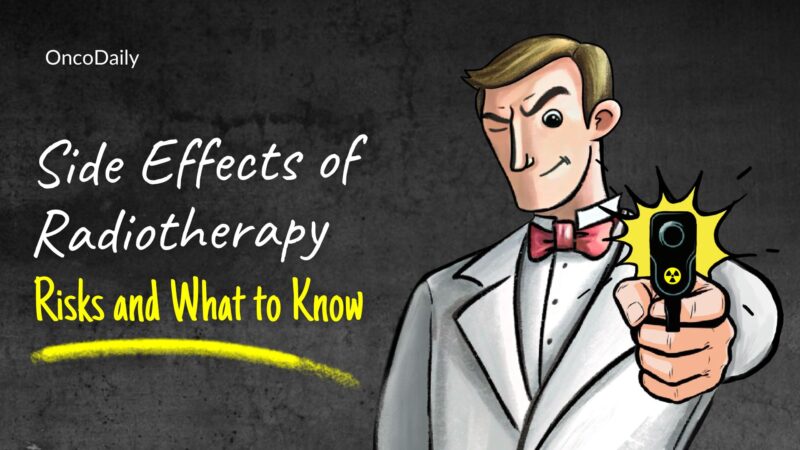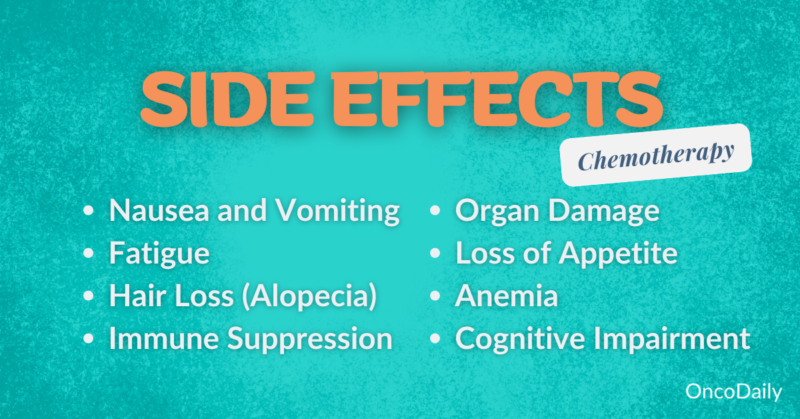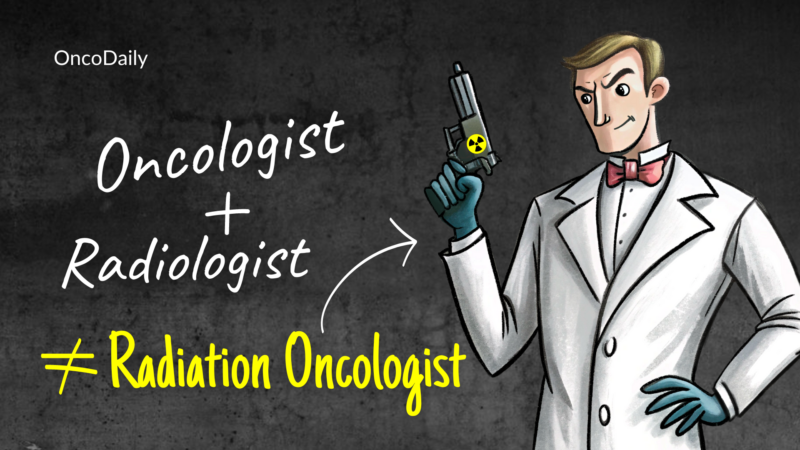
Radiotherapy for Anal Cancer: Types, Success Rate, Side Effects And More
What is Radiotherapy for Anal Cancer?
Radiotherapy is a cancer treatment that uses high-energy beams, to kill cancer cells. It works by damaging the DNA in cancer cells, stopping them from growing or spreading. In the case of anal cancer, radiotherapy is often combined with chemotherapy (chemoradiation) to increase effectiveness.
The procedure is typically non-invasive and involves external beam radiotherapy, where a machine directs radiation at the anal tumor from outside the body. The treatment is carefully planned to target the tumor while sparing nearby healthy tissue. Radiotherapy is used to shrink the tumor, control cancer growth, or eliminate remaining cancer cells after surgery.
Types of Radiotherapy for Anal Cancer
Different types of radiation therapy can be used to treat anal cancer. Lets talks about each type separately:
External-beam radiation therapy (EBRT)
This is the most common type of radiation used for anal cancer. It delivers strong radiation from outside the body directly to the cancer, much like an x-ray but with a higher dose. Each session lasts only a few minutes and is painless, with treatments often scheduled 5 days a week for 5 to 7 weeks.
Intensity-modulated radiation therapy (IMRT)
IMRT is a sophisticated form of EBRT and the preferred method for anal cancer. It uses a computer to adjust the radiation beams, shaping and aiming them at the tumor from different angles. The strength of the beams can also be altered, allowing for more precise targeting of the tumor and reducing radiation exposure to nearby healthy tissues.
Stereotactic body radiation therapy (SBRT)
SBRT might be used if anal cancer has returned or spread. This type of radiation delivers high-dose beams in just 1 to 5 treatments. It is highly focused and requires the patient to remain still, often using a special body frame for positioning.
Internal-beam radiation therapy (Brachytherapy)
This is less commonly used in anal cancer. It involves placing small radiation sources directly in or near the tumor to target the cancer more directly, reducing exposure to surrounding healthy tissues.
How Effective is Radiotherapy for Anal Cancer?
Radiotherapy is highly effective in treating anal cancer, especially when combined with chemotherapy, a treatment approach known as chemoradiation. For stages I-III anal cancer, radiotherapy is often the primary treatment, aiming to shrink or eliminate the tumor while preserving anal function. Studies show high success rates, with many patients achieving long-term remission. The effectiveness of radiotherapy depends on factors like the stage of cancer, the size and location of the tumor, and how well the tumor responds to the treatment.
Advances in techniques such as intensity-modulated radiation therapy (IMRT) have improved precision, allowing higher radiation doses to the tumor while minimizing damage to surrounding healthy tissues. This increases the likelihood of controlling the cancer while reducing side effects.
In some cases, radiotherapy may also be used after surgery to reduce the risk of recurrence or to manage cancer that has spread to other parts of the body.
Success Rates for Early and Advanced Anal Cancer
The success rates of radiotherapy for anal cancer vary depending on the stage of the disease at diagnosis:
Early-Stage Anal Cancer (Stages I and II):
- High success rates: Radiotherapy combined with chemotherapy (chemoradiation) is highly effective for early-stage anal cancer..
- Preservation of anal function: Most patients with early-stage cancer can avoid surgery, maintaining bowel function and avoiding the need for a colostomy.
Advanced-Stage Anal Cancer (Stage III):
- In stage III, where cancer may have spread to nearby lymph nodes, chemoradiation is still the main treatment. The success rates are lower than in early stages but remain substantial.
- 5-year survival rate: Approximately 60% of patients with stage III anal cancer survive five years post-treatment, with some achieving long-term remission.
Metastatic Anal Cancer (Stage IV):
- For stage IV, where cancer has spread to distant organs, radiotherapy is often used to relieve symptoms and control tumor growth rather than cure the disease.
- 5-year survival rate: Around 36%, but this varies based on individual cases and the extent of cancer spread. (According to American Cancer Society, 2024)
Read Oncodaily’s special article on celebrities with anal cancer, featuring Desperate Housewives star Marcia Cross and her story of anal cancer diagnosis and treatment.

What are the Side Effects of Radiotherapy for Anal Cancer?
Radiotherapy for anal cancer can effectively target and destroy cancer cells, but it may also cause side effects due to the impact on surrounding healthy tissues. These side effects vary in severity and duration, depending on the dose of radiation and the area being treated. Common side effects can include skin irritation, digestive issues, and fatigue, while more severe effects may develop over time.
Short-term Side Effects
Short-term side effects of radiotherapy for anal cancer often include skin irritation, diarrhea, and fatigue, which typically occur due to the sensitive nature of the treated area and the impact of radiation on healthy tissues nearby. These effects are generally manageable with supportive care and tend to improve after treatment completion
- Diarrhea and Bowel Issues: Frequent bowel movements and diarrhea are common, caused by irritation and inflammation in the rectum and anus. This can make bowel movements painful and lead to bowel incontinence. Most symptoms improve within a few weeks after treatment ends.
- Skin Irritation: Radiotherapy often causes redness, blistering, and itching around the treated area. The skin may also darken, peel, or become dry. These reactions develop gradually and can affect both the treatment area and the ‘exit site’ where radiation passes through.
- Fatigue: Tiredness typically builds up over time during treatment and can last for several months afterward. Light exercise like short walks can help manage this fatigue.
- Nausea and Appetite Loss: Nausea may develop, impacting appetite. Staying hydrated and eating nutrient-dense foods is important during this time. Your doctor may recommend supplements or high-calorie drinks.
- Bladder Irritation: Radiation can inflame the bladder, causing symptoms like frequent urges to urinate or pain while urinating. Drinking plenty of water can help alleviate discomfort.
Long-term Side Effects of Anal Radiotherapy
Long-term side effects of anal radiotherapy may include changes in bowel habits, reproductive issues, urinary problems and etc. These effects vary among individuals and depend on the treatment intensity, but they can often be managed with medical support and lifestyle adjustments.
- Bowel Problems: Chronic bowel issues, such as scar tissue leading to bowel obstruction or bowel incontinence, may develop. Radiation damage can persist, causing discomfort long after treatment has ended.
- Vaginal and Reproductive Issues: In women, radiotherapy may cause vaginal dryness, narrowing, or scarring, leading to discomfort or fertility problems. Vaginal stenosis, or the shortening of the vaginal canal, can occur.
- Erectile Dysfunction in Men: Radiation can affect the pelvic nerves and blood vessels, leading to impotence.
- Bone Damage: The pelvic bones may weaken over time, increasing the risk of fractures.
- Radiation Proctitis: Chronic inflammation of the rectum can cause pain, bleeding, or rectal discharge. In severe cases, fistulas (abnormal connections) may develop between the rectum and other areas like the vagina.
- Frequent Urination: Radiation may make the bladder wall less stretchy, requiring more frequent urination.
- Blood in Urine: Fragile blood vessels can form in the bladder wall, potentially leading to blood in the urine.
- Narrowing of the Urethra: The tube through which urine passes may become narrower, causing difficulty in urination.
- Vitamin B12 Deficiency: Radiation can interfere with the body’s ability to absorb vitamin B12, leading to a deficiency.
- Lymphoedema: Radiotherapy can cause scar tissue in the lymph nodes, particularly in the groin, disrupting lymph flow and leading to fluid buildup (swelling).
- Pain in the Back Passage: Some people may experience long-term discomfort or pain in the anal region after radiotherapy. Your doctor can suggest treatments to help manage this pain.
To read more about Side effects of Radiotherapy Read Special Article by OncoDaily.

What Should Patients Expect During Radiation Treatment?
Before starting radiotherapy, your healthcare provider will conduct a simulation scan to measure the tumor, allowing for precise targeting of radiation beams. You may lie on your back or stomach during treatment, and small marks will be placed on your skin to outline the treatment area, often using permanent ink or tiny tattoos. This ensures consistent positioning for each session.
On treatment days, you’ll typically be asked to have a full bladder, and your position will be adjusted carefully with the aid of lights that align with the skin markings. The radiation machine will move around you without making contact. You won’t see or feel the radiation, which is similar to getting an X-ray but takes a bit longer.
During the treatment, the therapist will step out of the room while the machine delivers radiation to the tumor, although they can still see and hear you. It’s important to remain still during this brief procedure, which usually lasts just a few minutes, with the entire process taking less than an hour.
How Long Does It Take to See Results?
The timeline for seeing results from radiotherapy for anal cancer can vary depending on individual factors, including the specific cancer stage and treatment plan. Generally, patients may start to notice improvements within a few weeks after completing treatment, as the cancer cells are gradually destroyed and the body begins to heal. However, it can take several weeks or even months for the full effects of the treatment to become apparent, as the body continues to respond and recover. Regular follow-up appointments with the healthcare team are essential to monitor progress and evaluate the effectiveness of the treatment.
What Are the Costs of Radiotherapy for Anal Cancer?
The costs of radiotherapy for anal cancer can vary significantly depending on the country and healthcare system in which the treatment is provided. Factors influencing the overall cost include the type of radiotherapy used, the number of treatment fractions required, hospital fees, and additional expenses such as consultations and imaging tests. It’s essential for patients to discuss the potential costs with their healthcare provider and insurance company to understand their coverage options and any out-of-pocket expenses they may incur.
How Does Radiotherapy Compare to Other Treatments for Anal Cancer?
Radiotherapy for anal cancer is often compared to treatments like surgery and chemotherapy in terms of effectiveness and impact on quality of life. While surgery may be necessary in early-stage cases, radiotherapy, often combined with chemotherapy, is a standard approach that preserves the anal sphincter, reducing the need for permanent colostomy. This approach has demonstrated high success rates, especially in early stages, while minimizing long-term complications compared to surgery.
Radiotherapy
Benefits: Radiotherapy is often preferred for early-stage anal cancer and is frequently combined with chemotherapy (chemoradiation) to enhance effectiveness. It targets the tumor directly while sparing surrounding healthy tissues, reducing the risk of side effects. External beam radiotherapy and intensity-modulated radiation therapy (IMRT) allow for precise targeting, minimizing damage to nearby organs.
Limitations: While effective, radiotherapy can cause localized side effects, such as skin irritation, diarrhea, and fatigue. Some patients may also experience long-term complications, including changes in bowel and bladder function.
Long-Term Effectiveness: For patients with early-stage anal cancer, radiotherapy can be highly effective, leading to a favorable prognosis. It is often used as a primary treatment or adjuvant therapy after surgery if there is concern about residual cancer.
Chemotherapy
Benefits: Chemotherapy uses drugs to target cancer cells throughout the body, making it effective for cancers that have spread beyond the anus. It can enhance the effectiveness of radiotherapy when used in combination, increasing the likelihood of tumor reduction.
Limitations: Chemotherapy is associated with a range of side effects, including nausea, fatigue, hair loss, and weakened immune function. Patients may need to manage these effects throughout treatment.
Long-Term Effectiveness: The effectiveness of chemotherapy can vary significantly depending on the cancer stage and individual patient factors. It may be used as a primary treatment for more advanced anal cancer or in conjunction with surgery and radiotherapy for comprehensive care.

Surgery
Benefits: Surgery aims to remove the tumor and surrounding tissue, providing a definitive treatment option. For localized tumors, surgical resection can lead to a cure, especially if the cancer is detected early.
Limitations: Surgery may involve significant recovery time and can lead to complications, such as infection or changes in bowel function. In some cases, the entire anal sphincter may need to be removed, resulting in a permanent colostomy.
Long-Term Effectiveness: Surgical outcomes depend on tumor stage and surgical margins. While surgery can be effective for early-stage anal cancer, it may not be suitable for tumors that have spread or for patients with specific health concerns.
How Does Radiotherapy Affect Sexual Health and Fertility?
Radiotherapy for anal cancer can impact sexual health and fertility due to the proximity of treatment areas to reproductive organs. Patients may experience changes in sexual function, such as discomfort, reduced libido, or erectile dysfunction in men and vaginal dryness in women. Fertility can also be affected, particularly if radiation exposure involves the pelvic region. While these effects vary among individuals, supportive care options, including counseling, physical therapy, and medical interventions, are available to address these concerns and improve quality of life.
Effects on Sexual Health
Men: Radiotherapy can lead to erectile dysfunction, making it difficult to achieve or maintain an erection. This can affect intimate relationships and overall quality of life.
Women: Women may experience vaginal dryness, narrowing, and shrinkage of the vaginal canal, which can result in painful intercourse. Additionally, some women may enter early menopause as a result of the treatment. To manage these symptoms, healthcare providers may recommend using vaginal dilators or lubricants to enhance comfort during intercourse.
Fertility Considerations: Both men and women may face fertility challenges after undergoing radiotherapy for anal cancer. The treatment can affect reproductive organs, potentially leading to infertility. It’s essential for patients to discuss fertility preservation options with their healthcare team before starting treatment, especially if they wish to conceive in the future.
Long-Term Impact: Changes to sexual health and fertility may appear sometime after treatment and can be persistent. It is important for patients to communicate any concerns regarding sexual function or fertility with their healthcare providers, who can offer support and discuss available management strategies.
Can All Anal Cancer Patients Receive Radiotherapy?
Not all anal cancer patients are suitable candidates for radiotherapy, as eligibility depends on factors like the stage and location of the tumor, overall health, and pre-existing medical conditions. Patients with certain conditions, such as prior radiation exposure in the pelvic region or severe comorbidities, may face limitations. Doctors carefully evaluate these factors to determine the most effective and safe treatment plan for each individual.
- Stage of Cancer: Radiotherapy is often used for early-stage anal cancer (Stages I and II) and is important for locally advanced cases (Stage III).
- Location and Size of Tumor: The effectiveness of radiotherapy can depend on the tumor’s location and size. Large tumors or those in difficult-to-treat areas may not be suitable for radiotherapy.
- Patient’s Overall Health: General health and medical history play a significant role in determining eligibility. Patients with significant underlying health conditions may not be suitable candidates for radiotherapy.
- Prior Treatments: Previous treatments, such as surgery or chemotherapy, can impact the decision to use radiotherapy. Patients who have received extensive radiation to the pelvic area may not be able to undergo additional radiotherapy.
- Personal Preferences: Some patients may opt out of radiotherapy due to concerns about side effects or personal reasons. Open discussions with healthcare providers can help patients make informed decisions.
Ultimately, the decision regarding the use of radiotherapy should involve collaboration between the patient and their healthcare team, taking all relevant factors into account.
What Research is Being Done on Radiotherapy for Anal Cancer?
Radiotherapy with Weekly Cisplatin for Anal Cancer
Study Overview
The study by Jakobsen et al published in Radiotherapy and Oncology Journal in 2024, investigated the use of radiotherapy combined with weekly cisplatin for patients with SCCA. The goal was to determine if this treatment approach could provide effective outcomes with manageable side effects.
Key Findings
- A total of 116 patients were included in the study, with varying stages of cancer.
- The radiation doses administered ranged from 53.75 to 64 Gy, and the mean cumulative dose of cisplatin was 307.5 mg.
- Patients received treatment over an average of 43 days.
- Remarkably, 88.9% of patients achieved a complete response within six months of treatment.
- Long-term outcomes were promising, with 5-year disease-free survival (DFS) at 77% and overall survival (OS) at 86.4%.
- Side effects were generally mild, with only 20% of patients requiring hospitalization and a low incidence of significant hematological toxicity (grade 3 in 13.7% and grade 4 in 3.9% of patients).
How Can Patients Support Their Health During Radiotherapy?
Understanding Radiation Therapy
It’s crucial for patients to have a clear understanding of how radiotherapy works and the potential side effects they might experience. Be proactive in discussing with your healthcare provider what can be done to help minimize or relieve these side effects. Familiarize yourself with which side effects are expected in the short term and which may develop later on, potentially affecting your long-term health.
Communication is Key
Maintain open lines of communication with your healthcare team about any side effects you encounter. For instance, patients undergoing radiotherapy for anal cancer may experience issues like diarrhea, bleeding, and other gastrointestinal symptoms. Know the contact information for your healthcare provider and ensure you have access to a different number for after-hours questions or concerns.
Ask your Radiation Oncologist, Know Who is Your Doctor. Discover More by Special Article On Who Is Radiation Oncologist?

Documenting Your Experience
Keeping a diary can be an effective way to track your side effects and any changes in your physical, mental, or emotional state. This documentation will help you remember your concerns when attending appointments and will enable you to collaborate with your healthcare team to devise an effective management plan.
Practical Tips for Overall Health
By actively engaging in your treatment process and implementing these strategies, you can better support your overall health and well-being during radiotherapy and beyond.
- Nutrition: Focus on a balanced diet rich in fruits, vegetables, whole grains, and lean proteins. Staying hydrated is equally important. If you experience a loss of appetite, consider smaller, frequent meals that are nutrient-dense.
- Exercise: Engage in light physical activity, as tolerated. Gentle exercises like walking or stretching can help maintain energy levels and improve mood. Always consult your healthcare team before starting any exercise regimen.
- Mental Health: Pay attention to your emotional well-being. Consider mindfulness practices, such as meditation or deep breathing exercises, to reduce stress. Connecting with support groups or talking to a counselor can also provide valuable emotional support.
- Managing Side Effects: Be proactive about addressing side effects as they arise. Many side effects can be managed with medication or lifestyle adjustments, so don’t hesitate to discuss them with your healthcare team.
What Support is Available for Patients Undergoing Radiotherapy for Anal Cancer?
Patients receiving radiotherapy for anal cancer have access to a range of support options to help them manage the physical, emotional, and logistical challenges of treatment. This includes counseling services for emotional well-being, support groups for connecting with others undergoing similar experiences, and financial assistance programs to address treatment-related costs. Healthcare teams often provide tailored advice on managing side effects and maintaining a healthy lifestyle during therapy, ensuring comprehensive care throughout the process.
Local Support Groups
Support groups can be a valuable resource for sharing experiences and connecting with others facing similar challenges. Look for local cancer support organizations that offer groups specifically for anal cancer or general gastrointestinal cancers. These groups often provide a safe space to share feelings and discuss coping strategies.
- Hospital Resources: Many hospitals offer comprehensive support services for patients undergoing cancer treatment. Check if your treatment center has:
- Patient Navigators: These professionals can guide you through the treatment process, helping with logistics and connecting you to resources.
- Social Workers: Trained to help patients cope with the emotional and practical aspects of cancer treatment, social workers can provide counseling and support.
- Psychological Services: Some hospitals have mental health professionals specializing in oncology who can offer therapy and coping strategies tailored to cancer patients.
Charities and Nonprofit Organizations
Numerous charities provide support to cancer patients and their families. Some notable organizations include:
- Macmillan Cancer Support: This UK-based organization offers a range of services, including support lines, information resources, and local support groups.
- American Cancer Society: Offers a wealth of information, resources, and support services, including a national network of local chapters.
- Anal Cancer foundation: A nonprofit organization dedicated to raising awareness, funding research, and providing support for patients and survivors of anal cancer.
Online Resources and Communities
Consider joining online forums and support groups, where you can connect with others facing similar experiences. Websites like CancerCare and Reddit have dedicated forums for discussing cancer treatment and support.
- Counseling and Therapy
Individual therapy can be beneficial for processing emotions and developing coping strategies. Many therapists specialize in working with cancer patients, and some may offer services on a sliding scale based on income. - Educational Workshops and Seminars
Look for workshops or seminars focusing on coping with cancer, stress management, and healthy living during treatment. Many organizations and hospitals offer these educational opportunities. - Palliative Care Services
Palliative care focuses on providing relief from symptoms and stress associated with serious illness. This service can be beneficial for emotional support and improving overall quality of life.
FAQs
Does radiotherapy for anal cancer hurt?
Radiotherapy for anal cancer is generally painless, although some patients may experience discomfort in the treated area as side effects develop.
How soon after radiotherapy can I resume normal activities?
Most individuals can resume normal activities within a few days to a week after treatment, but it’s important to listen to your body and consult with your healthcare team about any specific concerns.
What follow-up care is required after radiotherapy for anal cancer?
Follow-up care typically involves regular check-ups with your oncologist to monitor for any recurrence of cancer and manage any long-term side effects.
How is radiotherapy for anal cancer delivered?
External beam radiotherapy for anal cancer is precisely targeted to the tumor area, with sessions typically lasting a few minutes each day over several weeks to maximize effectiveness while sparing healthy tissue.
What side effects can I expect from radiotherapy for anal cancer?
Radiotherapy for anal cancer may lead to side effects like skin irritation, fatigue, or bowel discomfort. Side effects vary, and your healthcare team can offer guidance on managing these as they occur.
How is radiotherapy for anal cancer delivered?
External beam radiotherapy for anal cancer is precisely targeted to the tumor area, with sessions typically lasting a few minutes each day over several weeks to maximize effectiveness while sparing healthy tissue.
Will radiotherapy affect my digestion or bowel movements?
Some patients report changes in digestion or bowel habits during and after radiotherapy, such as diarrhea or cramping. These usually improve with time and can be managed with dietary changes or medications as advised by your doctor.
Can radiotherapy be combined with other treatments for anal cancer?
Yes, radiotherapy is often used alongside chemotherapy for anal cancer, which can improve treatment effectiveness. Your oncologist will discuss if a combined approach is suitable for you.
Is skin care necessary during radiotherapy for anal cancer?
Keeping the treated skin clean and avoiding tight clothing can help prevent irritation. Your healthcare team may recommend specific lotions or creams to protect the skin during treatment.
Can radiotherapy cause long-term changes in bowel or urinary function?
Some patients may experience long-term effects, such as changes in bowel habits or mild urinary issues. Regular follow-up appointments help monitor and manage any persistent effects after treatment.
Written by Aren Karapetyan, MD
-
Challenging the Status Quo in Colorectal Cancer 2024
December 6-8, 2024
-
ESMO 2024 Congress
September 13-17, 2024
-
ASCO Annual Meeting
May 30 - June 4, 2024
-
Yvonne Award 2024
May 31, 2024
-
OncoThon 2024, Online
Feb. 15, 2024
-
Global Summit on War & Cancer 2023, Online
Dec. 14-16, 2023
